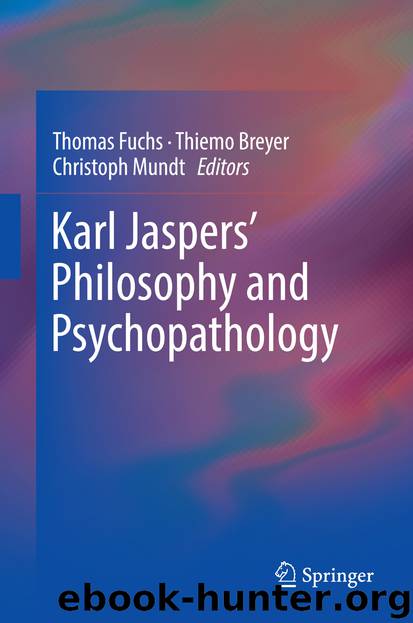Karl Jaspers’ Philosophy and Psychopathology by Thomas Fuchs Thiemo Breyer & Christoph Mundt

Author:Thomas Fuchs, Thiemo Breyer & Christoph Mundt
Language: eng
Format: epub
Publisher: Springer New York, New York, NY
6.3.2 Assessment of the Critique
The resulting question is whether Jaspers was even right in understanding “constructive-genetic psychopathology” (Jaspers 1997, p. 540) as theory. Might there not be a possibility that its terms about human existence lie in a realm very similar to that of Jaspers’ Illumination of Existence ? We can best approach this idea in a passage in which Jaspers analyzes Straus’ idea of the future-oriented nature of human becoming (Jaspers 1997, p. 545).
According to Straus, the development of our life narrative and in particular our relationship to the past is dependent on our future-oriented nature (Jaspers 1997; Straus 1960a). According to Jaspers, the prospects resulting from this observation apply, “with proper understanding to phenomena which in the last resort have their roots in the very Existence of Man in its historical, absolute and irreversible aspect. They have to be seen in light of this” (Jaspers 1997, p. 545).4 The reader may ask at this juncture wherein Jaspers’ “proper understanding” is distinguished from that which is supposedly improper. Jaspers further adds: “If however such experiences are grounded instead in the vital processes of becoming and their disturbances in a concrete objectivization of what can never be understood, then the vital substrate, a factor both impenetrable to understanding and obscure, replaces Existence itself, that which is understood but capable of an infinite illumination.” (Jaspers 1997, p. 545).5 Proper understanding would therefore be understanding of Existence and its infinite illumination; improper understanding, on the contrary, would be one that apprehends the affected person according to vital processes of becoming. Yet of what does the difference between Existence and vital processes of becoming consist? Evidently it consists in the first being an “unlimited incomprehensible that becomes illuminated,” and the latter, contrarily, an “unilluminable incomprehensible” (Jaspers 1997). The latter is a “concrete objectivization, ” the former is not. However, this distinction is not further justified by Jaspers, and it thus remains almost arbitrary. It shows that Jaspers delineates something that shows commonalities: why should the Strausian concept of “becoming life” not similarly point to the moment of man that eludes scientific knowledge (Erkenntnis)? Were this so, Jaspers’ entire critique would be inaccurate: these terms would then have to be understood in terms of “transcendental thought” (Jaspers 1997, p. 756), and they would not have to be measured according to the norms of scientific knowledge and they would not need to be criticized for attempting to scientifically determine man as a whole. Yet Jaspers overlooks this possibility in his critique. Thus, in the best case, his critique is incomplete.
Furthermore, if we consider the texts of Straus and von Gebsattel that Jaspers analyzed, it becomes clear that the contradictions of the Jaspersian critique point to an underlying ambivalence in these texts: the extent to which the terms developed here (basic disturbance , disturbance of becoming) are thought by these authors as “scientific theory” and “explanation ” of mechanisms outside of consciousness, is, in our opinion, not clearly distinguishable (even if Jaspers claims this is so).
Download
This site does not store any files on its server. We only index and link to content provided by other sites. Please contact the content providers to delete copyright contents if any and email us, we'll remove relevant links or contents immediately.
Rewire Your Anxious Brain by Catherine M. Pittman(17620)
Talking to Strangers by Malcolm Gladwell(11956)
The Art of Thinking Clearly by Rolf Dobelli(8901)
Mindhunter: Inside the FBI's Elite Serial Crime Unit by John E. Douglas & Mark Olshaker(7875)
Becoming Supernatural by Dr. Joe Dispenza(7143)
Change Your Questions, Change Your Life by Marilee Adams(6687)
The Road Less Traveled by M. Scott Peck(6672)
Nudge - Improving Decisions about Health, Wealth, and Happiness by Thaler Sunstein(6667)
The Lost Art of Listening by Michael P. Nichols(6514)
Enlightenment Now: The Case for Reason, Science, Humanism, and Progress by Steven Pinker(6435)
Win Bigly by Scott Adams(6342)
Mastermind: How to Think Like Sherlock Holmes by Maria Konnikova(6278)
The Way of Zen by Alan W. Watts(5829)
Daring Greatly by Brene Brown(5679)
Big Magic: Creative Living Beyond Fear by Elizabeth Gilbert(4763)
Grit by Angela Duckworth(4760)
Men In Love by Nancy Friday(4367)
Flow by Mihaly Csikszentmihalyi(4079)
The Four Tendencies by Gretchen Rubin(4044)
